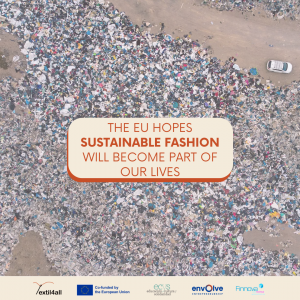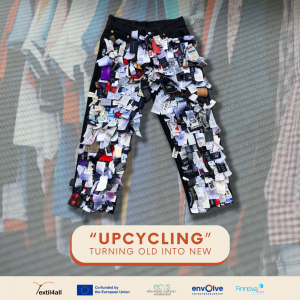
International day of clean air for blue skies: tackling air pollution in fashion and textiles
Every year on the 7th the United Nations commemorates the International day of clean air for blue skies. This day recognizes the importance of clean

The EU generates 12.6 million tonnes of textile waste per year. Clothing and footwear alone account for 5.2 million tonnes of waste, equivalent to 12 kg of waste per person each year. Currently, only 22% of post-consumer textile waste is collected separately for reuse or recycling, while the rest is often incinerated or landfilled. In this scenario, and given the urgent need to move towards a more sustainable and circular textile sector, entrepreneurship, innovation and technology play a leading role.
The textile sector is the second most polluting industry in the world and the EU has set out to reduce the environmental and climate change impacts of textiles. To do so, it is crucial to shift towards circular business models to save on raw materials, energy, water and land use, emissions and waste. Implementing and scaling up circular business models requires technical, social and business model innovation, as well as policy, consumer and educational enablers.
Not surprisingly, there are many European projects aimed at establishing sustainable practices in fashion and textiles.
Promoting social innovation, sustainability and circular economy in the fashion and textile sector should be a priority for everyone.The future of the textile sector in the EU will be marked by sustainability, technology, customisation and adaptation to new forms of trade and regulation.Companies that can adapt to these changes and take advantage of emerging opportunities will be better positioned to succeed in the European textile market.The EU offers several programmes and funds to support the textile industry, funding for research and innovation, as well as initiatives to promote the internationalisation and competitiveness of European companies in the global market. European programmes such as COSME, LIFE, HORIZON, INTERREG open calls for proposals to finance projects pursuing these objectives.
It is time to accelerate this transition towards a sustainable and circular textile industry.European funds are there for this purpose, and to apply for them is a question of finding good travelling companions.

CirCoAx is an accelerator for SMEs, Start-ups and entrepreneurs in the fashion and textile sectors, through which 30 beneficiaries can receive mentoring, as well as technical and financial assistance to promote best practices that contribute to achieving these sustainability and circularity goals.

Every year on the 7th the United Nations commemorates the International day of clean air for blue skies. This day recognizes the importance of clean
The Break Fellowship is a scholarship programme, worth over €7,000, funded by the European Union within the NextGenerationEU framework. The aim is to build an

This MODA SOSTENIBLE AL INVEST Verde project is designed with clear and ambitious goals to strengthen the fashion industry in both countries, specifically in Lima and/or ICA (Peru) and in Bogotá and 59 municipalities of the department of Cundinamarca (Colombia). Through active collaboration between various entities, the aim is to positively transform the business landscape over a period of 20 months.

Funded by the Spanish Service for the Internationalisation of Education (SEPIE) through the ERASMUS+ programme. With a budget of 60,000 euros and a duration of 19 months, the initiative aims to offer training and job opportunities to people with more difficulties in accessing a job, with a special focus on women in San Cristobal de los Angeles in Madrid (Spain) and Thessaloniki (Greece). Led by the non-profit association Education, Culture and Solidarity (ECYS), and formed by a consortium between the Greek Envolve and the Finnova Foundation Belgium, TEXTIL4ALL targets the textile sector, which faces much criticism for its environmental impact and lack of social responsibility. The initiative has two main objectives: to give access to training and employment to social sectors seeking job opportunities, recognising their integral value in society; and to promote a more sustainable textile industry committed to current environmental challenges, addressing issues such as ‘fast fashion’ and its negative consequences.

The European directives for the textile and fashion sector had a strong presence at the last Copenhagen Fashion Week. Copenhagen Fashion Week’s ambitious sustainability action

As we have mentioned several times before, the fashion industry is considered one of the most polluting industries in the world, responsible for about 20%

Upcycling is not the same as recycling: “Recycling takes consumer materials — mostly plastic, paper, metal and glass — and breaks them down so their